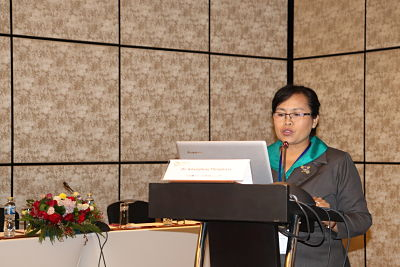LEARN Lao PDR - Innovative Research on the Situation of Adolescent Girls
Discussion details
Under the auspices of the LEARN Programme, new research is yielding interesting results on the situation of adolescent girls in Laos. Dr. Khampeng Phongluxa is leading an Adolescent Girls’ Situation Analysis (AGSA) to establish a provincial level adolescent girl profile in Lao PDR. Evidence generated from this survey will contribute to concerted efforts to inform policy and programing that reflect the needs of adolescents in Laos, but will also offer new insights as to their behaviors and needs.
Dr Khampheng Phongluxa is head of the Department of Coordination and Research Information Management (DCRIM) at the Lao Tropical and Public Health Institute (LaoTPHI, formerly National Institute of Public Health). As part of the LEARN Programme, Dr. Khampeng also acts as the focal point for implementing the Knowledge Translation Strategy of LaoTPHI. LEARN is supporting her with a research grant for a Post-Doctoral study entitled: Lao PDR Adolescent Girls Situation Analysis in 3 districts of Bokeo province: Establishment Provincial level Adolescent Girls Profile. This is part of a wider initiative led by UNFPA (Noi Framework) to establish a baseline of key indicators for adolescent girls in Laos. Progress against this baseline can then be monitored over the coming years as ‘Noi’ grows older.
Noi represents all 700,230 adolescent girls aged 10-19 in Lao PDR, and was created as an advocacy tool to raise awareness, build partnerships and increase investments in adolescent girls that enable them to achieve their full potential. Her progress is closely monitored through 5 indicators aligned with the global SDG framework until 2030 when she will turn 25. The AGSA Study is the first large-scale, mixed-method research project in Lao PDR that solely focusses on adolescents of this age group, and will fill an important data gap. It will further establish a baseline of key indicators against which progress can be measured against during the implementation of the SDG agenda.
Following the data collection between November and December 2017, Dr Khampeng and the AGSA partners conducted a thorough analysis and writing up of the results. They continued with a comprehensive dissemination effort, and in September presented the results with the concerned Provincial and District Authorities in Bokeo, including the Provincial Assembly, Lao Women’s Union and Lao Youth Union. Their feedback was integrated into the formal presentation of the Study during 3rd Adolescent Research Day in October. LEARN and UNFPA continue to support Knowledge Translation activities relating to the AGSA, and at the end of November, stakeholders were invited to identify the major findings from the study, the key messages and resulting recommendations, which would support the production of a Policy Brief, which will be completed at the end of the year. Other KT activities will include the production of a research summary, and formal policy dialogue to present her policy recommendations.
In parallel, Dr. Khampheng continues to support the same research in Savannakhet, contributing inputs to improve research tools and the methodology based on the initial experience in Bokeo Province. Plan International also replicated this study in Oudomxay Province, and thus collectively, partners have established a profile in three out of the 17 provinces in the country.
LEARN is proud of this collaborative effort to produce evidence-informed policy recommendations that will address the specific needs of adolescents and youths in Lao PDR. Lao TPHI will focus on health recommendations that aim to reduce the significant adolescent birth rate of 83 per 1000 births (LSIS II, 2018) which increases the risk of maternal mortality, and presents further challenges alongside high levels of malnutrition.


Log in with your EU Login account to post or comment on the platform.